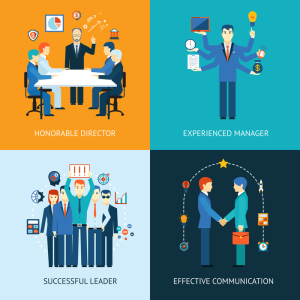
We are accustomed to any number of conventional interview questions, and everyone has their favorites. But many shrewd CEOs and executives are digging a little deeper, looking beyond what they see in a job candidates’ executive profiles, resumes and cover letters. They are asking some very unusual interview questions designed to reveal more of your personality and ensure you are the perfect fit for their company.
“What would you do in the event of a zombie apocalypse?”
— Ashley Morris, Capriotti Sandwich Shop CEO
Of course, there is no right or wrong answer here. It’s simply a fun question Morris likes to ask to see how a candidate will respond under pressure. This gives him a feel for how effectively they react without prior thought or planning, as well as insight into their moral compass and whether they will fit into the company’s culture.
“What’s your superpower … or spirit animal?”
— Ryan Holmes, HootSuite CEO
Holmes feels the response he gets to this question gives him a greater understanding of a candidate’s work habits, beyond what’s seen on an executive’s profile.
“On a scale of one to 10, how weird are you?”
— Tony Hsieh, Zappos CEO
One of the reasons Hsieh likes to ask this quirky question is to ensure the candidate is a good fit for the casual culture of Zappos. According to Hsieh, whose company values include fun and a little weirdness, it’s not really important what number you choose, unless it’s at the extreme end, such as one or ten. Whereas a one might indicate you are too conservative for his company, a ten, on the other hand might show a tendency toward being a little too weird for them.
“Tell me something that’s true, that almost nobody agrees with you on.”
— Peter Thiel, PayPal co-founder
Co-founder of PayPal Thiel values those who are not afraid to say what’s on their minds. He finds this question, though uncomfortable, helps him see how courageous a candidate can be in discussing something that may be in direct opposition to the interviewer’s opinions.
“What was the last costume you wore?”
— David Gilboa, Warby Parker co-CEO
What the candidate remembers wearing isn’t a problem. It’s more about making sure they fit in with the eyewear retailer’s relaxed environment. With core values that include adding “fun and quirkiness” into everything they do, Warby feels that even the most capable candidate would be a mistake to hire if their work style was not a good fit.
“Tell me about your failures.”
— Jenny Ming, president and CEO of Charlotte Russe (former chief executive of Old Navy)
Resumes and cover letters don’t show failures, only successes. Ming feels this question is a good test of how willing the candidate is to take a risk, and being honest enough to acknowledge when things don’t go right. The example could come from either personal or business life. What’s important is how the person handled the failure and how they overcame or moved forward afterward. The clothing store executive says the responses give her insight into how willing the candidate is to admit when something goes wrong.
So, to prepare, you might want to start thinking about what your super power or weirdness level is so you are ready for your next interview.
How Lying on a Resume Cost These 5 Executives Big Time
Executive Resumes

Lying on your resume has always been taboo, but it’s a tempting prospect given the fact no one is going to check up on every little detail you claim. However, when you are putting together your executive resume bio, it’s critical to make sure every piece of information is irrefutable. Learning how resume lies have cost some executives at major companies will help you realize the importance of honesty when using an executive resume service.
Scott Thompson of Yahoo
Thompson, the former CEO of Yahoo, made a major blunder on his executive resume bio when he listed his degree from Stonehill College as a computer science degree. After all, he was applying to one of the biggest Internet companies in the world. Unfortunately, his actual degree was in accounting. Once this falsehood was discovered by an activist investor, he resigned his position in May of 2014.
Ronald Zarrella of Bausch & Lomb
To obtain his position as CEO of Bausch & Lomb, Ronald Zarrella claimed to have earned an MBA at New York University. While Zarrella did take classes at NYU, he never earned a degree there. In 2002, the company discovered this discrepancy; however, instead of firing him or requesting his resignation, they simply revoked his $1.1 million bonus for the year. He continued to hold the position until his retirement in 2008.
David Edmondson of RadioShack
Edmondson served as the CEO of RadioShack from 2005 to 2006. On his executive resume bio, he claimed to hold two degrees, including a theology degree from Heartland Baptist Bible College that requires three years of attendance. In reality, he did not hold a degree at all and only attended the heartland Baptist Bible College for two semesters. He resigned after this was uncovered.
Marilee Jones of the Massachusetts Institute of Technology
One would think a prestigious university like MIT would conduct a thorough background check on their executives. However, Marilee Jones was hired as the Dean of Admissions in 1997 under the impression she held a total of three degrees. The truth is she did not have any degrees. This information was received by the university via an anonymous tip, which forced Jones to quit the position.
Jeffrey Papows of IBM’s Lotus
When IBM sought executives for its Lotus project, Jeffrey Papows applied, claiming to hold a PhD from Pepperdine University. He also stated he was a black belt in taekwondo and flew airplanes while in the Marines. Unfortunately, none of these facts turned out to be true. He resigned in 2000, not because of these lies in particular, but due to sexual harassment accusations brought by a former Lotus executive.
As you can see, lying on your resume may land the job, but once these falsehoods are uncovered, the consequences can be devastating. If you’re looking for executive resume writing services, contact us. We can help you showcase your skills without feeling the need to embellish the facts.
What Not to Include on Your C-Level Resume
Executive Resumes

Building resumes that get you hired can feel like an insurmountable task. It can be difficult to determine which information is essential and what is better left unsaid. Below are some resume “don’ts”:
Objective
If you look at resume examples for lower level jobs, you will see an objective line at the top that details the goals of the individual. When it comes to executive level resumes, however, this section is unnecessary. Applying for the job indicates your goal. Instead, consider writing an executive summary that succinctly details your achievements.
Too Many Details
In the case of resumes, less is often more. You don’t need to list every employer you’ve had since your first job. Instead, focus on only the jobs that lend skills for the job in question. Consider focusing on one or two areas in which you have made the biggest impact in your career.
Personal Information
Professional executive resume writers emphasize leaving out the personal details of your life. Your resume is not the place to list your age, personal interests, relationship status, hobbies, school GPA or other details considered personal. This includes providing a photo. You want to make the first impression in person.
Your References
If you’re used to putting your references in your resume or even including the phrase, “references available upon request,” reconsider it. If the company you are interviewing with wants to talk to references, they will ask for them without prompting.
An Unprofessional Email Address
One of the best parts of a personal email address is you can let your creativity shine. However, it’s best to make sure the email address you include in the contact information on your resume is professional. Instead of using your cutesy personal email address, set up a special account for your job hunt that includes your first name, last name, initials or a combination of these.
Current Employer Information
When you’re dealing with executive-level positions, you don’t want to be contacted at work when you’re looking for a new position. For this reason, it’s best to leave off contact information related to your current job. Likewise, it’s best to forgo listing salary information on your resume. Your goal is to promote your skills, not your monetary worth.
The best executive writing services can help you re-evaluate your resume and eliminate the unnecessary information that could cost you the positions for which you’ve applied. Learning how to create resumes that get you hired will be an invaluable tool as you make your way up the corporate ladder.
If you’re looking for professional executive resume writers to help you polish your C-level resume, contact us. We can help you start from the beginning to develop an attractive, yet concise resume, including why you would be an asset to an employer. We can also evaluate your current resume and eliminate the unnecessary details causing more harm than good as you seek the ideal career path.
10 Traits Every Executive Should Have
Executive Resumes

To be effective in upper-level management, you need a specific set of traits. It’s also important to exhibit these attributes through your actions, as well as the company’s executive bio and your executive profile for social media. While there are other factors affecting your abilities as a manager, displaying these traits will increase your chances of success.
1. Leadership Skills
A personal drive to lead others is a necessity for those who want to serve on the executive level. While leadership skills can be acquired traits, an innate tendency to lead will serve you better in a position of power within a company.
2. Sales Drive
Some salespeople are adept at making a pitch, while others pride themselves in their ability to close. If you want to be a successful executive, it’s best to be skilled at both making a pitch and closing the sale. As a leader within the company, you will need to sell yourself, your ideas and the business on a regular basis.
3. A Realistic Viewpoint
Having a dream and goals is important for a successful career, but a realistic viewpoint is even more critical. You need to be able to recognize what is possible and execute the required processes to achieve those goals.
4. Patience
Patience is a virtue every executive should have. You can’t expect all of your efforts to produce results immediately. Patiently waiting for the proper timing and the right resources will help you bring your business to the forefront.
5. A Broad Perspective
Keeping short-term goals in mind is essential for ensuring daily objectives are met for your company, but having a broader perspective can be invaluable. Seeing the bigger picture will help you make smaller decisions along the way.
6. Courage
When most people think of courage, they consider the risks that need to be taken to move forward. However, courage can also be defined as the strength required to stop or change direction.
7. Financial Expertise
Many businesses have a finance division to handle the day-to-day financial elements. However, many companies want an executive team that can keep the budget in mind and understand how money flow factors into the function of the business.
8. Domain Expertise
Technology has become a major component in the world of business. You should command a basic knowledge of the latest technology as it relates to your industry. Don’t forget to showcase your technical knowledge in your executive bio.
9. Honor
The dictionary defines honor as adhering to what is right. In the business world, displaying honor lends an authenticity to your management style. An honorable philosophy and actions allow you to readily connect with your team and your customers on an emotional level.
10. Perseverance
The business world is rapidly changing, which can make it difficult to keep up and stay on top. This is why the drive to keep going, even when things aren’t proceeding as planned, is important.
If you need help highlighting these personality traits in your executive profile,contact us. Our professional resume writing services are designed to showcase your best attributes, making you more attractive to prospective employers.
Expert Advice: Be Less Responsible At Work
Success Strategies

Why would an expert suggest that being less responsible at work is a good idea? But that is exactly what Dorie Clark, a marketing strategist and professional speaker who teaches at Duke University’s Fuqua School of Business says in the Ideas section of Time. Why You Should Be Less Responsible at Work goes against some opinions about making yourself irreplaceable and takes a look at a larger perspective of your career path.
Get The Right Things Done
The main focus of Ms. Clark’s advice is that in order to lead, you have to learn to prioritize what your responsibilities entail. That means figuring out the 20% of your to-do list that yields the 80% of your results. It also means learning to procrastinate strategically by doing something appealing instead of the job you are stuck on — but making your procrastination activity something else on your list of things that need to get done. It also means learning to delegate.
Delegation is not just passing off your work to somebody else. Delegation is a skill that successful CEOs do all the time as they build a team of people who take pride in their contributions. At the other end of the career path, there isn’t much to delegate yet, but you can learn that sometimes saying NO to others is saying YES to yourself.
It’s far too easy to fill our agenda with tasks that look busy but don’t actually give much reward. It’s also too easy to take over all the little responsibilities that others neglect and neglect your own because you are busy doing too much. Learning how to prioritize effectively, to procrastinate strategically, and to delegate appropriately is good advice for all of us.
How Creative Can A Work Wardrobe Be?
Career & Workplace

It was interesting to see the comments on Anna Akbari’s DailyWorth post. “Don’t Dress for the Job You Want” is a statement that seems to fly in the face of the general consensus on working wardrobes. But she does make some good points to consider when dressing to express yourself instead of your position:
- demonstrate that you get it
- connect with your audience
- exude confidence
Context is Everything
Those first two points are a reminder that we work with other people. The way we dress does affect how others react to us, and it’s naive to insist it doesn’t matter. To quote Ms. Akbari, “demonstrating that you understand the unwritten dress codes and larger ethos of any given context is the first rule of successful self-presentation.”
You have to connect before you can communicate, and if everyone around you is wearing a “uniform”, it shows they are all part of the same group culture. Wearing at least part of that uniform, or wearing the uniform in an acceptably unique way, will be a signal that you belong even though you are a bit different. If you don’t care about the group, you don’t try to connect or get what they are about — and at that point, why are you working there? In an interview situation, why are you saying you want to work where you don’t get the group’s culture?
There are times when a unique status symbol is an investment tool, but it entirely depends on the group you are in. Cowboy boots communicate one thing in Dallas and a different thing in D.C., but there is more to the symbolism than identity. If those boots are high-quality and well-kept, the wearer is signalling confidence even if everyone else is in tied-up Oxfords. That confidence is important, because you need it however you dress. If wearing a unique item makes you feel more like “yourself” and gives you confidence, that’s good. But make sure you are respecting the context of your surroundings.
Common Job Search Mistakes Anybody Can Make
Job Search

AARP’s website and magazine will often have very good career advice. Kerry Hannon’s slideshow about 8 Common Mistakes Older Job Seekers Make is targeted to the older worker but actually could apply to all of us. Here’s why:
- Mistake: kicking back & taking a break. The problem isn’t in taking a needed vacation, but in failing to maintain an active presence in your field. Try blogging or consulting so when you resume your job search, you have evidence you didn’t stagnate.
- Mistake: using dated email accounts. It’s an excellent idea to have a dedicated professional email account that is your name, your initials & last name, or your name + your expertise. But make sure it’s also a currently respected address. AOL & Yahoo are not going to work like Google or Outlook to enhance professional image right now, but these things change rapidly so pay attention.
- Mistake: low or missing digital presence. Privacy is not the same as invisibility, and most potential employers will look online. Social media and LinkedIn profile development are no longer optional for professionals.
- Mistake: refusing to be flexible about salary requirements. You may be offered a lower wage but can negotiate compensatory perks, for instance. Looking at the bigger salary picture can get you in the door.
- Mistake: overlooking contacts. You never know who you will run into again, who can introduce you to your next boss, or who is going to be helpful. Ideally you are being helpful to the others in your network, too, because it goes both ways and comes around again.
- Mistake: overdoing your resume. If it is bloated with outdated detail, hard to read, and over two pages, you overdid it. Time for a resume update! Do your research and make it concise. They can ask you for more detail in the interview.
- Mistake: ruling out jobs. It may not be a perfect fit, but a job that is mostly a good fit will be perfect with the right attitude.
- Mistake: waiting for the perfect job to open up. Here’s the truth: there is no perfect job. That’s okay, because people aren’t perfect anyway. The same skill set and experience can transfer beautifully into any number of possibilities so be open to them all.
These mistakes are certainly not limited to any age group. If you have been making one, fix it and you could find that next job!
Can You Do The Digital Handshake?
Videos

With the growing number of video interviews, there’s not a good reason to assume you won’t be asked to be part of one. Business video chats are not in the same category as a Skype or Google hangout because there is a level of professional behavior expected from all parties. Many business meetings are being held in a video conference, too, so these skills are going to be essential in most careers.
One of The New Secrets to Rocking Your Skype Interview that Scott Dockweiler gives us on The Muse is the “digital handshake.” This substitute for a physical shaking of hands is a way to show you are friendly, professional, and ready to get started. This is how you do the first impression successfully, laying the foundation for good communication during the rest of the meeting. Without that good first impression, the rest of the meeting is an attempt to overcome bad vibes.
Components of The Digital Handshake
- Look at the camera
- Lean slightly forward, shoulders & eyes focusing ahead
- Nod your head in a slow, confident, deliberate gesture without breaking eye contact
Now I can hear some of you saying…”I’m looking at a camera! What’s the eye contact there?” You need to remember, in a video meeting that the camera is where you look when you are speaking. When the other party speaks, look at the screen, but when you speak, look at the camera. Some people use a photograph with a hole in it for the lens to put over the camera as a reminder.
Why A Digital Handshake Is Important
The whole video business meeting dynamic is inventing itself, and we are still seeing things change. But even a few years ago, global trends indicated that business and video conferencing were only going to increase. Since the use of video eliminates some of the geographic limitations, we are going to have to be prepared for some cross-cultural challenges along with the ordinary challenge of impressing a remote viewer with your professional abilities.
That simple nod and the body language accompanying it says you are ready to listen and contribute to the meeting — so it can start.
